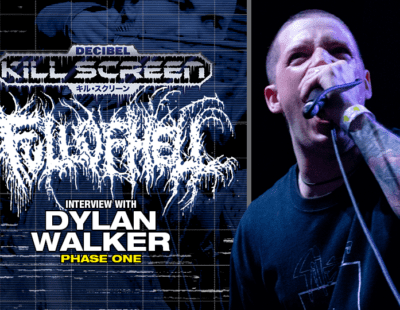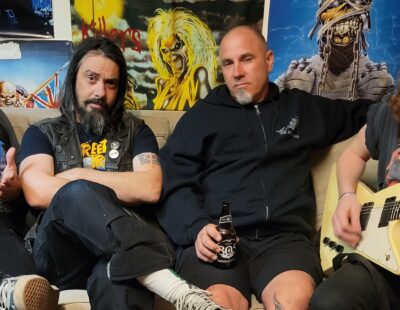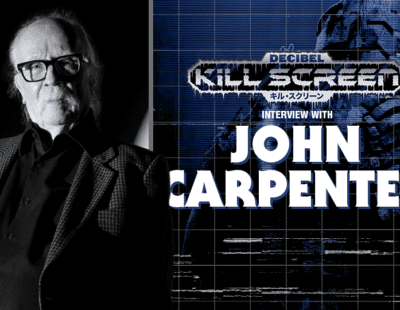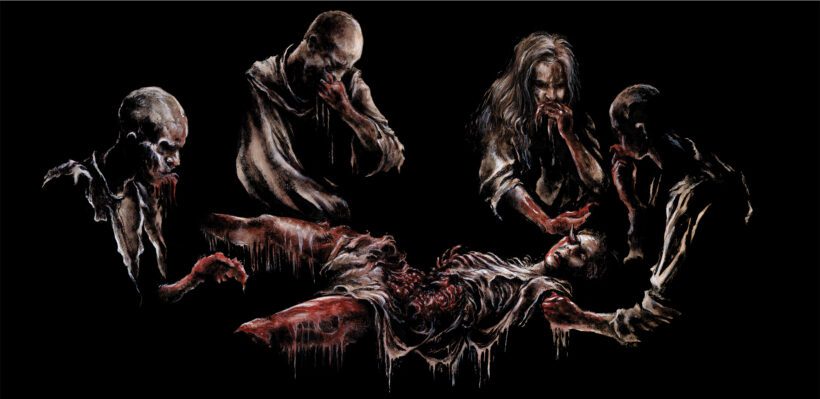
Italian cinema redefined horror in the 1970s and 80s, with auteurs with names like Bava, Argento and the incomparable Lucio Fulci becoming masters of the dark art on the silver screen to a new generation of cringe-loving voyeurs.
Fabio Frizzi was Fulci’s right hand man, providing the sonic backdrop throughout some of his biggest genre accomplishments, from The Beyond, City of the Living Dead and Manhattan Baby, to the timeless video nasty Zombi 2 (known as Zombie here in North America).
Now, Frizzi revisits the gore-filled epic decades later with Zombie: Composer’s Cut(available July 28th through Cadabra Records) which sees the master of auditory suspense carefully orchestrate new music to this timeless score, infusing new elements to accent specific scenes in the film in the listener’s mind, while adhering to Fulci’s monstrous film.
The complete uncut score of of Frizzi’s Zombie: Composer’s Cut is available in a plush vinyl edition, pressed on 150-gram colored vinyl in multiple variants, packaged in a deluxe heavyweight tip-on gatefold jacket, adorned in newly commissioned art by Jeremy Hush that starkly resembles the look of the original film and movie artwork. The inlay features brand new essays by Stephen Thrower and J. Blake Fichera, as well as liner notes from Frizzi himself.
Decibel caught up with the Italian maestro for a deep dive into his career and relationship with the prolific Fulci, a deep analysis into building a creepy score and a re-examination on all things Zombie.
Zombie has an incredible cult following. Score aside for a moment, what’s your thoughts on the film and how it’s latched on to generations of horror fans over 40 years after its release?
I think that every work of art has its own destiny, certainly linked to the quality of whoever built it, created it. But in a certain sense independent. And the charm of this film is something undeniable and eternal. If we then want to try to analyze why, the story, the performers, the photography, the director’s hand and his solutions… In short, without knowing exactly why, we all have the feeling that Zombie is a unique film.
How has the process been reexamining these iconic scores from your career in recent years? From Zombie to The Beyond and Dark Chamber. It must be a fascinating process tackling these pieces with the benefit of decades of hindsight?
Yes, it’s fun to re-appropriate what was born from yourself many years ago and reinterpret it, make it relive in new, different ways. Dark Chamber, for example, was born from my need to bring some cornerstones of my production to the keyboard of the classical guitar (actually two), while The Beyond Composer’s Cut was my first attempt to reinvent an entire score, with the primary purpose of bringing on stage a live performance, sonorizing with my band the old film. For Zombie the bet was even stronger, the bar moved even higher.
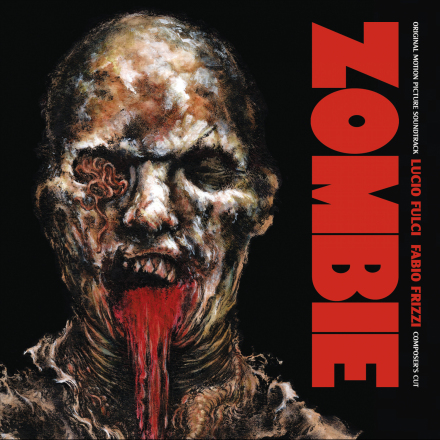
In short, for imaginable reasons, I considered the old score as a canvas on which to draw new musical images, creating a completely different and contemporary soundtrack. For example, the themes contained in the tracks of the original album, “Zombi 2 – Seq 2″ and “Zombi 2 – Seq 3,” have practically become the the backing tracks on which I have written new themes, exploiting the inviting triplet rhythm to direct me towards new emotions, with the help of my fantastic Frizzi 2 Fulci band, who interpreted everything perfectly.
Much has been made about your relationship and chemistry with Fulci. What do you think it was about the pairing that created such magic?
I have told it many times, surely there was a good empathy, between Lucio, a true cinema professional with a long and varied militancy in all sectors of creativity destined for the big screen and me, an enthusiastic young musician almost incredulous of actually being in the place and in the role he aspired to, from the beginning. I believe that good working relationships arise from a common way of feeling and from a form of mutual respect.
I had a lot to learn and certainly a lot to give, in terms of freshness and enthusiasm. He got on well and fueled my creative vein. If even today the union of image and music in those creepy films to a large part of the audience means that that artistic encounter was truly special.
Take me through the early stages of developing mood and dread for a score like Zombie? The main theme, with its chant-like-synths and pulsing bass, is unshakably eerie and brooding. Was it much of a learning curve, finding your way through the horror genre?
Absolutely, a learning curve… It was the first time for me, I didn’t know yet that a good part of my career would have been drawn precisely on that genre. I was quite disoriented at the beginning, enthusiastic and lost. Then I concentrated, I listened to lots of music to orient myself and find the right path. Even then I surrounded myself with high quality musicians, Maurizio Guarini for keyboards and Adriano Giordanella for percussions were the main collaborators.
And yes, even if in that case we didn’t use the Mellotron (which I would soon use for other Fulcian music), the idea of writing a kind of pagan hymn was the right choice. When I think about Zombi 2 (the original Italian title) I know it was a very important step in my life.
Personally, do you have a favorite piece from the film? It’s hard to beat zombie vs. shark!
The scene of the zombie against the shark has entered into legend, also thanks to the passion of enthusiast people like Tarantino, who studied the filming and editing technique in depth. But I also think of the incredible sequence of Paola eye pierced by the splinter of wood (in moviola I asked Vincenzo Tomassi, the editor, to show me where he had cut, between truth and makeup, I was incredulous) or the wonderful sequence in which the zombies come out of the ground. Just think that one of the stuntmen that Fulci used, Ottaviano dell’Acqua, is considered a legend, also thanks to that scene.
We know you’re a massive guitar aficionado. Are there any guitar heroes of yours, or bands/artists that inspire you past and present? Maybe even some in the heavy music spectrum?
Even if many musical instruments have captured my attention and my love in these long years of passion and profession, I cannot deny that the crux of the skein was really her, that wooden figurine with six strings. And when I watch the performances of old and very young phenomena on the web I always think it’s a fascinating object. The list of guitarists I have admired (and often emulated) would be very long. So I’ll tell you three, one for each basic type of guitar.
Andres Segovia, a “historical man” as my classical guitar teacher, who had studied with him, called him. In fact, from the beginning of the 1900s, thanks to Segovia, what was mainly an instrument for serenades became the great protagonist and inspirer of so much new musical culture, all over the world.
In the acoustic guitar there are many ‘sacred monsters’, but today I want to name the one who is more of a composer and singer, but who has a personal and very tasty finger picking style, James Taylor. I studied a lot about his textures and I must say that even today I don’t mind singing and playing with friends “You’ve Got a Friend” at all.
Finally, the electric guitar, and even here there were many leaders. I’ll tell you one that was important to me, even though I wasn’t a true fanatic of his band, Pink Floyd, David Gilmour. In short, his sound, his research, his brand was that period so loved by the world of European guitarists that when I asked one of my guitarists to create a solo on a certain musical moment, wonderful sonorities came out, which linked very well with my atmospheres… Well, those notes came indirectly from him, from the great fascination he exerted on my collaborators.
So thanks to Andres, James and David.
Zombie: Composer’s Cut is now available for preorder and will be released on July 28th. Find preorders at the Cadabra Records website HERE.




